英语六年级上册各个单元短语总结
(完整版)人教版六年级英语上册各单元知识点汇总
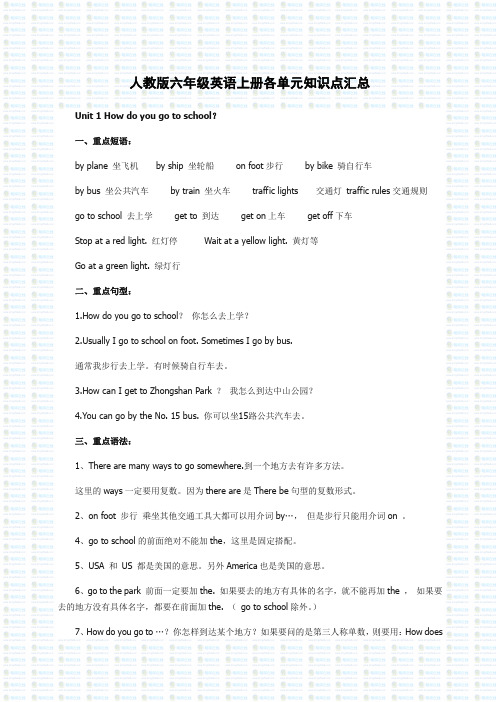
人教版六年级英语上册各单元知识点汇总Unit 1 How do you go to school?一、重点短语:by plane 坐飞机by ship 坐轮船on foot步行by bike 骑自行车by bus 坐公共汽车by train 坐火车traffic lights 交通灯traffic rules交通规则go to school 去上学get to 到达get on上车get off下车Stop at a red light. 红灯停Wait at a yellow light. 黄灯等Go at a green light. 绿灯行二、重点句型:1.How do you go to school?你怎么去上学?ually I go to school on foot. Sometimes I go by bus.通常我步行去上学。
有时候骑自行车去。
3.How can I get to Zhongshan Park ?我怎么到达中山公园?4.You can go by the No. 15 bus. 你可以坐15路公共汽车去。
三、重点语法:1、There are many ways to go somewhere.到一个地方去有许多方法。
这里的ways一定要用复数。
因为there are是There be句型的复数形式。
2、on foot 步行乘坐其他交通工具大都可以用介词by…,但是步行只能用介词on 。
4、go to school的前面绝对不能加the,这里是固定搭配。
5、USA 和US 都是美国的意思。
另外America也是美国的意思。
6、go to the park 前面一定要加the. 如果要去的地方有具体的名字,就不能再加the ,如果要去的地方没有具体名字,都要在前面加the. (go to school除外。
)7、How do you go to …?你怎样到达某个地方?如果要问的是第三人称单数,则要用:How doeshe/she…go to …?8、反义词:get on(上车)---get off(下车)near(近的)—far(远的)fast(快的)—slow(慢的)because(因为)—why(为什么)same(相同的)—different(不同的)9、近义词:see you---goodbye sure---certainly---of course10、频度副词:always 总是,一直usually 通常often经常sometimes 有时候never 从来不Unit 2 Where is the science museum?一、重点短语:library 图书馆post office 邮局hospital医院cinema 电影院bookstore书店science museum科学博物馆turn left向左转turn right 向右转go straight 直行north北south南east东west西next to靠近、与……。
六年级上册英语单元总结

以下是六年级上册英语每个单元的总结:Unit 1:How can I get there?这个单元主要学习如何用英语问路和指路。
学生将学习如何使用“turn left”、“turn right”、“go straight”等短语来指导方向。
此外,学生还将学习如何使用“Can you tell me the way to…?”等句型来问路。
通过本单元的学习,学生将能够用英语进行基本的问路和指路交流。
Unit 2:What’s the matter?这个单元主要学习如何用英语谈论健康和医疗。
学生将学习如何使用“What’s the matter?”、“How are you?”等句型来询问他人的健康状况。
此外,学生还将学习如何使用“take medicine”、“stay in bed”等短语来给出建议。
通过本单元的学习,学生将能够用英语进行基本的健康和医疗交流。
Unit 3:My weekend plan这个单元主要学习如何用英语谈论和计划周末活动。
学生将学习如何使用“What are you going to do this weekend?”等句型来询问他人的计划。
此外,学生还将学习如何使用“I’m going to…”等句型来表达自己的计划。
通过本单元的学习,学生将能够用英语进行基本的周末计划交流。
Unit 4:Drawing in the museum这个单元主要学习如何用英语谈论艺术和博物馆。
学生将学习如何使用“What can you see in the picture?”等句型来描述图片中的内容。
此外,学生还将学习如何使用“draw”等动词来表达自己的绘画技能。
通过本单元的学习,学生将能够用英语进行基本的艺术和博物馆交流。
Unit 5:My new friend这个单元主要学习如何用英语描述人物特征和交朋友。
学生将学习如何使用“He’s…”等句型来描述他人的特征。
此外,学生还将学习如何使用“Do youwant to be my friend?”等句型来邀请他人交朋友。
外研版六年级上册英语短语

外研版六年级上册英语短语一、Module 1。
1. more than:超过;多于。
2. the Great Wall:长城。
3. in the east of:在……东部(内部)4. a picture of:一张……的照片。
二、Module 2。
1. dancing club:舞蹈俱乐部。
2. want to do sth.:想要做某事。
3. join in:参加(活动等)三、Module 3。
1. collect stamps:收集邮票。
2. have got:有(英式英语)3. lots of:许多。
四、Module 4。
1. Thanksgiving Day:感恩节。
2. Flag Day:国旗日。
3. fly the flag:升旗。
五、Module 5。
1. speak English:说英语。
2. write to sb.:给某人写信。
3. pen friend:笔友。
六、Module 6。
1. a postcard from:一张来自……的明信片。
2. in the park:在公园里。
3. a picture of the Great Wall:一张长城的照片。
七、Module 7。
1. in the world:在世界上。
2. a long time ago:很久以前。
3. not really:不完全是;不见得。
八、Module 8。
1. read stories:读故事。
2. clean one's room:打扫某人的房间。
3. go to the library:去图书馆。
九、Module 9。
1. feel sad:感到难过。
2. be proud of:为……感到自豪。
3. look at:看。
十、Module 10。
1. go to bed:上床睡觉。
2. get up:起床。
3. on sports day:在运动日。
六年级上册1~6单元英语笔记
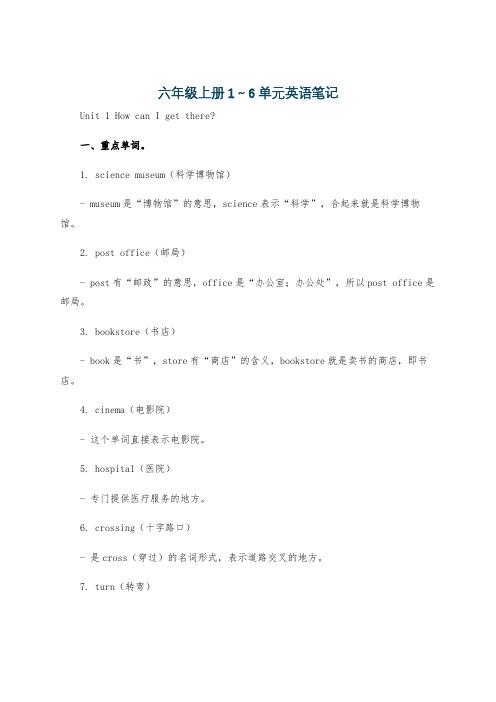
六年级上册1~6单元英语笔记Unit 1 How can I get there?一、重点单词。
1. science museum(科学博物馆)- museum是“博物馆”的意思,science表示“科学”,合起来就是科学博物馆。
2. post office(邮局)- post有“邮政”的意思,office是“办公室;办公处”,所以post office是邮局。
3. bookstore(书店)- book是“书”,store有“商店”的含义,bookstore就是卖书的商店,即书店。
4. cinema(电影院)- 这个单词直接表示电影院。
5. hospital(医院)- 专门提供医疗服务的地方。
6. crossing(十字路口)- 是cross(穿过)的名词形式,表示道路交叉的地方。
7. turn(转弯)- 既可以作动词,如turn left(向左转),turn right(向右转);也可以作名词。
二、重点短语。
1. near(在……附近)- 例如:The post office is near the bookstore.(邮局在书店附近。
)2. next to(紧挨着;与……相邻)- My home is next to the cinema.(我的家紧挨着电影院。
)3. in front of(在……前面)- There is a tree in front of my house.(我家前面有一棵树。
注意:in front of是在物体外部的前面,而in the front of是在物体内部的前面,如There is a blackboard in the front of the classroom.教室里前面有一块黑板。
)4. behind(在……后面)- The cat is behind the box.(猫在盒子后面。
)5. go straight(直走)- Go straight and you can see the hospital.(直走你就能看到医院。
新版pep六年级上册英语各单元知识点总结
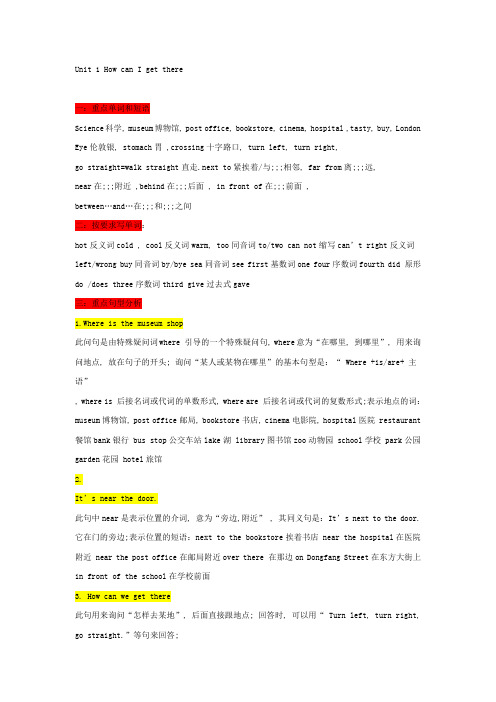
Unit 1 How can I get there一:重点单词和短语Science科学, museum博物馆, post office, bookstore, cinema, hospital ,tasty, buy, London Eye伦敦银, stomach胃 ,crossing十字路口, turn left, turn right,go straight=walk straight直走.next to紧挨着/与;;;相邻, far from离;;;远,near在;;;附近 ,behind在;;;后面 , in front of在;;;前面 ,between…and…在;;;和;;;之间二:按要求写单词:hot反义词cold , cool反义词warm, too同音词to/two can not缩写can’t right反义词left/wrong buy同音词by/bye sea同音词see first基数词one four序数词fourth did 原形do /does three序数词third give过去式gave三:重点句型分析1.Where is the museum shop此问句是由特殊疑问词where 引导的一个特殊疑问句, where意为“在哪里, 到哪里”, 用来询问地点, 放在句子的开头; 询问“某人或某物在哪里”的基本句型是:“ Where +is/are+ 主语”, where is 后接名词或代词的单数形式, where are 后接名词或代词的复数形式;表示地点的词:museum博物馆, post office邮局, bookstore书店, cinema电影院, hospital医院 restaurant 餐馆bank银行 bus stop公交车站lake湖 library图书馆zoo动物园 school学校 park公园garden花园 hotel旅馆2.It’s near the door.此句中near是表示位置的介词, 意为“旁边,附近” , 其同义句是:It’s next to the door.它在门的旁边;表示位置的短语:next to the bookstore挨着书店 near the hospital在医院附近 near the post office在邮局附近over there 在那边on Dongfang Street在东方大街上in front of the school在学校前面3. How can we get there此句用来询问“怎样去某地”, 后面直接跟地点; 回答时, 可以用“ Turn left, turn right, go straight.”等句来回答;同义句:1.Can you tell me the way to+地点2.Where is the +地点3.Which is the way to +地点4.Turn left at the bookstore. Then turn right at the hospital.此句是指路的句型; 常用到的句型有:turn left, 向左转turn right, 向右转go straight直着走;同时表示在某处的介词用at.5.Is the Thames far from hereNo, it isn’t.此句是个be动词开头的一般疑问句, 其回答要用Yes或No. 句中的far from意为“离……远”;反义词组为next to.Unit 2 Ways to go to school一:重点单词和短语on foot步行, by bus =take a bus 乘公交车 by plane,乘飞机 by taxi 乘出租车by ship乘船 by subway 乘地铁by train乘火车 by bike骑自行车by ferry 乘轮渡Hooray好极了slow down 慢下来, stop 停 wait等 pay attention to注意 cross the road 横穿马路 traffic light通信号灯at home在家 missedmiss的过去式想念different,不同chopsticks,筷子复数cross穿过look right向右看 same 相同的door门look at朝;;;看play with和;;;一起玩二:按要求写单词:go 反义词come foot复数feet child复数childrenearly反义词late good反义词bad坏 take带走反义词bring拿来slow反义词quick/fast go 过去式went do过去式 diddo第三人称单数 doesgo第三人称单数 goessame 相同的反义词different不同的miss过去式 missedwrong 错误反义词right正确 can否定形式can’t三:重点句型分析1.How do you come to school你们怎么来学校的此问句是由特殊疑问词how引导的特殊疑问句, 用于询问对方的出行方式; 回答时要根据具体情况作答;表示地点的词:Germany德国 Munich慕尼黑 England英国 Australia澳大利亚school学校 the park 公园the cinema电影院 the hospital医院 the post office邮局the bus stop公共汽车站 home家2.Usually, I come on foot.=Usually, I walk.通常情况下,我步行来;此句是对出行方式的回答句; 其中usually意为“通常”, 表示频率很大, on foot意为“步行”; 一般用by表示出行方式; By后面一定要直接加交通工具的单数形式, 只有“小脚丫”foot与on 搭配, “步行”用on foot表示;3.I must pay attention to the traffic lights.我必须注意交通信号灯; Must是情态动词,意为“必须”后面跟动词原形;动作词组:wear a helmet戴头盔 pay attention to the traffic lights注意交通信号灯look right向右看4.Don’t go at the red light别闯红灯此句是Don’t开头的否定祈使句, don’t后面跟动词原形;意为“不要做某事”;动作词组:run跑 go at the red light闯红灯 touch the door触摸门Eg. Don’t smoke.不要吸烟;/禁止吸烟;Don’t take photos.禁止拍照;5We must look right before crossing the road.我们在横穿马路前必须看看右边;此句中must是情态动词, 意为“必须”后面跟动词原形, 在此句中before是一个介词, 而介词后面跟动词-ing形式;6. There is no door on the bus.公共汽车上没有门;此句是there be句型的单数句, be动词要根据后面名词的单复数形式来决定, 名词为单数或不可数名词就用there is, 名词为复数就用there are. 此句中no door意为“没有门”, 表示单数含义,因此要用there is开头;Unit 3 My weekend plan一:知识点小结重点单词和短语visit拜访film电影 see a film看电影 trip旅游take a trip去旅游supermarket, 超市evening晚上,傍晚 tonight在今晚tomorrow明天next week下周dictionary 字典comic 滑稽的comic book连环画册word book单词本postcard明信片learn 学习teach教disturb打扰 without没有pool池子 jump in跳进 remember记住 lesson 课space太空 travel尤指长途旅游 half一半 price 价格moon月亮make a snowman 堆雪人share sth事 with sb人和某人分享某物lots of= a lot of 许多二:按要求写单词look for 同义词 find leaf 复数 leaves picture 复数 picturessee 同义词 watch/look film 同义词 movie buy 反义词 sellam /is /are 原形 be is /am 复数are this 反义词 thatgoing 原形 go swim 现在进行时swimming can否定形式can’ttoo同音词 two /to clothe复数clothes ice-skate现在进行时ice-skating autumn同义词 fall autumn反义词spring teach 反义词 learn三:重点句型分析1.---What are you going to do tomorrow---I’m going to have an art lesson.此句是个一般将来时态的特殊疑问句; 用了be going to 结构; “be going to +动词原形”构成一般将来时态, 表示计划、安排将要做的事或根据目前推测将要发生的动作, 意为“打算, 将要”;表示时间的单词:evening晚上,傍晚 tonight在今晚tomorrow明天next week 下周this morning今天早晨 this afternoon今天下午 this evening 今天晚上 this weekend 下周末动词短语原形:make a snowman 堆雪人 take a trip去旅游see a film看电影 visit my grandparents 拜访祖父母watch TV看电视learn how to swim学怎样游泳go skating去滑冰row a boat划船go fishing 去钓鱼 go skiing去滑雪 go shopping去购物 make mooncakes做月饼 read a poem读诗eg: I’m going to make a snowman.我打算去堆雪人;We’re going fishing.我们打算去钓鱼;2.We are going to draw some pictures in Renmin Park.此句是be going to 结构的肯定句式; 基本结构为:主语+ be going to +动词原形+表示将来的时间;Some一些,用于肯定句中, 后接可数名词的复数形式或不可数名词, 而在疑问句或否定中表示一些要用any;3---Where are you going---We’re going to the cinema.此句是where 引导的一般将来时态的特殊疑问句, where意为“哪里”, 它是对地点提问的特殊疑问词, 因此回答时要回答一个具体的地点;表示地点的词:school学校 park 公园 cinema电影院 hospital医院 post office邮局 bus stop公共汽车站 home家 supermarket超市museum博物馆, bookstore书店 , restaurant餐馆bank银行lake湖 library图书馆zoo动物园park公园garden花园 hotel旅馆4---When are you going---Next Monday.此句中when意为“什么时候, 何时”, 它引导的疑问句用来对年、月、日等时间进行提问; 如:---When do you go to school in the morning---At 8:00.5---How can you learn to swim without going to a pool此句是由how 引导的特殊疑问句, 询问别人做事的方式、方法; 句中的can 意为“能够”, 是情态动词,后面跟动词原形; “learn to do something,”学习做某件事, 一般表示还没学或还没做的事情,含义将来的意思;第四单元Unit 4 I have a pen pal一、重点单词和短语pen pal笔友hobby爱好 idea主意studies学习第三人称单数 puzzle谜语hiking徒步旅行forest森林 gift礼物 sometimes有时 angry,生气shout大喊 bushy浓密的 have to不得不get … from…,从;;;得到;;;reading books 读书read stories读故事 do kung fu练功夫 play sports 进行体育运动play the pipa 弹琵琶climb mountains爬山 listen to music听音乐 sing English songs 唱英文歌fly kites放风筝 on a farm在一个农场里 write an e mail to 给;;;写封电子邮件 on the playground在运动场上六 live in住在;;;按要求写单词二、按要求写单词have第三人称单数 has do三单形式does do 否定形式don’tdoes 否定形式doesn’t like 三单形式likes he 所有格形式 histalk动词-ing形式 talking hobby三单形式hobbies story三单形式 stories read三单形式 reads live三单形式 lives swim动词-ing形式 swimmingdo动词-ing形式 doing sing动词-ing形式 singing go动词-ing形式 going teach动词-ing形式 teaching also同义词 too play动词-ing形式 playing student复数students dance动词-ing形式dancing write动词-ing形式writing puzzle复数puzzles hike动词-ing形式 hiking learn动词-ing形式learningfriend复数 friends cook三单形式cooks study三单形式 studiesgo 三单形式goes teach三单形式teaches different反义词 samemake三单形式makes talk 三单形式talks love 三单形式lovessleep三单形式 sleeps let三单形式lets sing三单形式 singsdance 三单形式dances sang 原形sing was原形 is/amthrew原形throw looked原形 look did原形do/does true反义词false三、重点句型分析1.问:What are sb’s hobbies 某人的爱好是什么询问某人的爱好答:主语 +like/likes +动词-ing形式+其他; ;;;喜欢;;;此处是对别人的爱好提问及回答的句型,问句中一般hobby要用复数形式, 因为别人的爱好不只一个, 特别注意hobby一词的复数形式变化规则, 变y为i再加-es;答句是一般现在时态的三单人称的句型; 当主语是第三人称单数时, 后面的动词要用它的第三人称单数形式, 同时like意为“喜欢”, 而喜欢做某事2.结构:like + v-ing 即like 后面跟动词的-ing形式Eg: What are Peter’s hobbies He likes reading stories.动词-ing形式:singing唱歌 dancing跳舞 reading stories 读故事playing football踢足球 doing kung fu 练功夫doing word puzzle猜字谜 go hiking 远足 watching TV看电视 drawing pictures 画画listening to music听音乐going fishing 钓鱼3、Does he live in SydneyNo, he doesn’t.此句是助动词does开头的一般疑问句; 其回答要根据助动词和主语来决定;结构为“Does+ 三单人称+ 动词原形”, 肯定回答结构: Yes, 主语+ does, 否定回答结构: No, 主语+ doesn’t. 4、So he doe sn’t like Zac’s music.此句是含有实意动词的否定句, 其结构为:主语+ don’t/ doesn’t+ 动词原形+其他; 当主语是第三人称单数时, 后面的否定助动词要用doesn’t而不是don’t;Unit 5 What does he do 知识点总结一:重点单词和短语factory工厂 worker,工人postman,邮递员businessman商人 police officer警察fisherman 渔民 scientist,科学家pilot飞行员 coach教练job工作, tamer驯服手 dangerous危险farmer农民 honey蜂蜜 stung叮 assistant助手接待员cracker骇客解密高手 nuts果仁think of考虑/有;;;想法go to work去工作 study hard努力学习 stay healthy保持健康 go home 回家 lots of许多 go to the camp去度假营 be good at擅长;;;head teacher校长二:按要求写词语do三单 does work三单 works he主格 his所有格 him宾格she主格 her宾格或所有格 business名词 businessmanfish名词 fisher can 否定形式can’t drive 名词driver teach 名词teacher country复数countries clean名词cleaner write 名词writer sing名词singer dancer 动词dance player 动词 play worker动词 work is否定形式isn’tgo现在分词 going see三单 sees big 反义词smalltall 反义词short thin反义词 fat/strong short 反义词tall/longsea同音词 see lots of =a lot of has 原形havehealthy名词 health life 动词live hard反义词 easy stay三单 stays study 三单studies science名词 scientist university复数 universities those反义词 thesedifferent 反义词same like三单 likes go三单 goes want三单 wants run现在分词 running report 名词reporter use现在分词 using quick 副词quickly they主格 them宾格 their所有格 children 单数child didn’t 否定形式don’t /doesn’t unusal 反义词usual dangerous 反义词safe farm名词 farmer test名词 tester eat 现在分词eating have三单has三:重点句型分析1.What does he doHe’s a businessman.这是一个询问职业的句型, 它的构成是“ What do/ does+某些人+do”, 可以用“某人+ be+a/an+职业名词”来回答; 询问职业还有一个句型是“ What + be+某人”; 如上面的句子还可以说“ What is he ”;表示职业的词:worker工人 postman邮递员businessman商人coach教练police officer警察 fisherman渔民 scientist,科学家pilot飞行员tamer驯服手farmer农民assistant助手接待员teacher老师 cleaner清洁工doctor医生nurse护士 dentist牙医 tailor裁缝 salespersons售货员 pianist钢琴家2 .---Where does he work---He works at sea.当你想询问他人在哪儿工作时, 用“ Where do/ does+ 某些人+ work”这个句型; 我们通常用一个表示地点的介宾短语来回答这个句型; 介宾短语是由介词加上名词或代词构成的;表示地点的介词短语:at a university 在一所大学in a gym在一个体育馆at sea 在海上on a boat在船上 at the zoo在动物园 in a school 在一所学校in a car company在一家汽车公司 in a bank在一家银行3. ---How does he go to work---He goes to work by bike.要询问别人的上班方式, 可以用“ How do/ does+人物+ go to work”句式来询问, 回答时要用到”by+交通工具的单词“或者是on foot;表示交通方式的词: by the No.15 bus乘15路公交车on foot步行,by bus 乘公交车 by plane,乘飞机 by taxi 乘出租车by ship乘船by subway 乘地铁bytrain乘火车 by bike骑自行车by ferry乘轮渡4. What a great job此句是由“what”引导的感叹句:“what”意为“多么”用作定语,修饰名词被强调部分,单数可数名词前要加不定冠词a/an,复数可数名词或不可数名词前不用冠词;这类句子的结构形式是:What+a/an+形容词+名词+主语+谓语+it is. 如:What a clever girl she is多么聪明的姑娘呀Unit6 How do you feel一:重点单词和短语Angry生气afraid害怕 sad伤心worried担心 happy快乐see a doctor看医生wear穿 more,更多deep身 breath呼吸 take a deep breath深呼吸count to ten 数到十popcorn爆米花make,制作wait等check检查planted种植的过去式grow生长或成长a little worried有一点点担心be angry with…与;;;生气be afraid of ;;;害怕;;;domore exercise做更多的运动 wear warm clothes穿暖和的衣服 get some drinks 拿一些饮料 have some popcorn 吃一些爆米花chase the mice追赶老鼠二:按要求写词语First基数词one chase 三单chases mice单数 mouse chase 现在分词chasing these 反义词those these单数 this sad反义词 happy here反义词 there can’t 肯定形式can can’t 完全形式can not don’t完全形式 do not feel 三单feels friends 单数friend suggestions单数 suggestion warm 反义词cool cold 反义词hot clothes单数clothe much 比较级more worry形容词worried sunny名词 sun hears 动词原形hear say 三单says strong反义词thin strong 近义词fat should否定形式shouldn’t picture复数 pictures ant复数 ants tell反义词 retell hungry反义词 full bad 反义词good ill 反义词 healthy making原形 make doing 原形do planted 原形plant plant 动词过去式 planted waiting动词原形 wait三:重点句型分析1.They are afraid of him.此句中be afraid of 意为“ 害怕某人”; 例如: I am afraid of my maths teacher. 我害怕我的数学老师;2.The cat is angry with them.此句中be angry with意为“ 对某人生气”;例如: I broken the cup. My mother is angry with me. 我打碎了杯子; 妈妈对我很生气;3.What’s wrong此句用于询问对方有什么问题或有什么不顺心的事情, 意为:怎么啦出什么事了例如:A: What’s wrong, Jim 吉姆,你怎么啦B: Maybe I am ill. 也许我病了;4.He should see a doctor this morning建议某人应该做某事的句型此句中should 为情态动词,表示“应该,应当”;此句用来给别人提建议;例如:He should work harder. 他应该更加努力;You should help your mother with the housework. 你应该帮你母亲做家务;5. What are you doing此句是现在进行时态的特殊疑问句, 其基本结构为:疑问词+be+主语+其他例如:What is he doing now回答:He is swimming.肯定句结构为:主语+be+动词-ing形式+其他.例如:We are running now。
知识点总结(知识清单)-2024-2025学年外研版(三起)英语六年级上册

外研版(三起)六年级英语上册单元知识点Module 1一、短语:1、the Great Wall长城2、visit the US拜访(参观、游玩)美国3、in New York在纽约4、look at 看...5、a picture of... 一张....图画(相片)6、tell me more about...多给我讲点关于...7、how long多长8、It`s about ...它是大约(关于)9、twenty thousand kilometres long 两万千米长10、tell me something about…告诉我关于...的事11、how big 多大12、eight million people 八百万人13、twenty million people 两千万人14、be great 太棒了15、an animal 一只动物16、in the east of… 在...的东部17、in the west/south/north of … 在...的西/南/北部18、San Francisco 旧金山19、a (big) map of... 一(大)张...地图20、lots of=a lot of=many/much 许多21、from...to.. 从....到......22、a big country一个大国23、every day and night 每日每夜二、句子1、These postcards are great ! 这些明信片真棒!Yes, they are. 是的,它们是。
2、Tell me more about the Great Wall.多给我讲点关于长城的3、How long is it? 它有多长?It’s more than twenty thousand kilometres long. 它有两万多千米长。
4、How big is it? 它有多大?It has got more than eight million people.它有八百多万人口。
六年级上册英语一到六单元知识总结
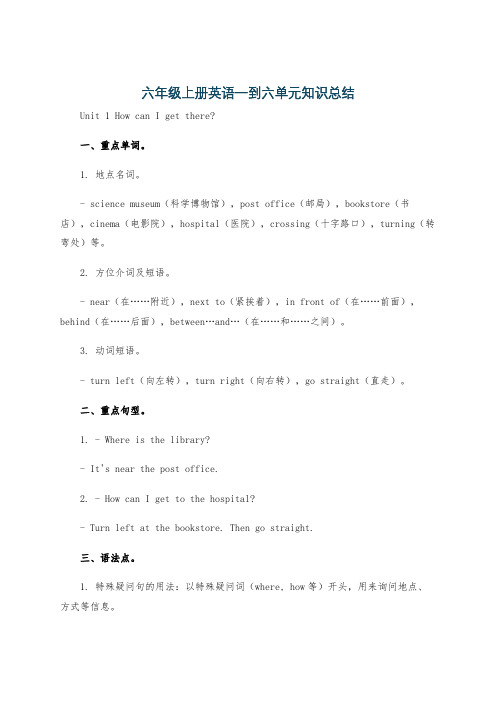
六年级上册英语一到六单元知识总结Unit 1 How can I get there?一、重点单词。
1. 地点名词。
- science museum(科学博物馆),post office(邮局),bookstore(书店),cinema(电影院),hospital(医院),crossing(十字路口),turning(转弯处)等。
2. 方位介词及短语。
- near(在……附近),next to(紧挨着),in front of(在……前面),behind(在……后面),between…and…(在……和……之间)。
3. 动词短语。
- turn left(向左转),turn right(向右转),go straight(直走)。
二、重点句型。
1. - Where is the library?- It's near the post office.2. - How can I get to the hospital?- Turn left at the bookstore. Then go straight.三、语法点。
1. 特殊疑问句的用法:以特殊疑问词(where, how等)开头,用来询问地点、方式等信息。
2. 一般现在时在问路指路中的运用。
Unit 2 Ways to go to school.一、重点单词。
1. 交通工具名词。
- by bike(骑自行车),by bus(乘公共汽车),by train(乘火车),by plane(乘飞机),on foot(步行),ship(轮船),subway(地铁)等。
2. 形容词。
- slow(慢的),fast(快的)。
3. 其他。
- traffic(交通),traffic lights(交通灯),stop(停),wait(等)。
二、重点句型。
1. - How do you come to school?- Usually, I come on foot.2. - How can I get to the Fuxing Hospital?- Take the No. 57 bus over there.三、语法点。
六年级英语上册各单元知识点归类总结
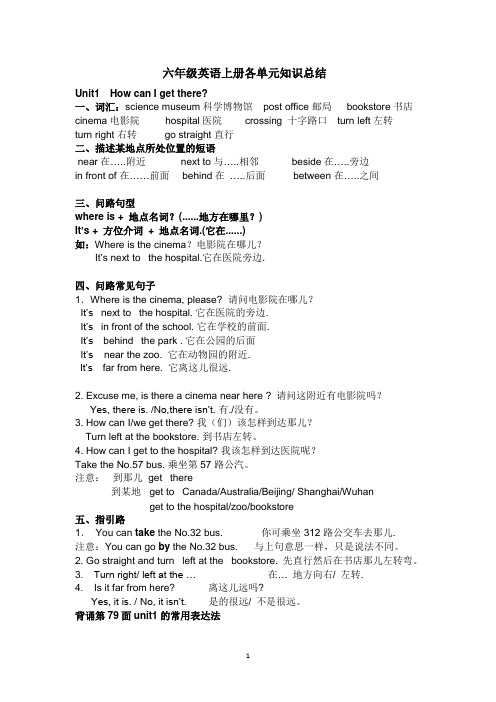
六年级英语上册各单元知识总结Unit1 How can I get there?一、词汇:science museum科学博物馆post office 邮局bookstore书店cinema电影院hospital医院crossing 十字路口turn left左转turn right右转go straight直行二、描述某地点所处位置的短语near在…..附近next to与…..相邻beside在…..旁边in front of 在……前面behind在…..后面between 在…..之间三、问路句型where is + 地点名词?(......地方在哪里?)It’s + 方位介词+ 地点名词.(它在......)如:Where is the cinema?电影院在哪儿?It’s next to the hospital.它在医院旁边.四、问路常见句子1.Where is the cinema, please? 请问电影院在哪儿?It’s next to the hospital. 它在医院的旁边.It’s in front of the school. 它在学校的前面.It’s behind the park . 它在公园的后面It’s near the zoo. 它在动物园的附近.It’s far from here. 它离这儿很远.2. Excuse me, is there a cinema near here ? 请问这附近有电影院吗?Yes, there is. /No,there isn’t.有./没有。
3. How can I/we get there? 我(们)该怎样到达那儿?Turn left at the bookstore. 到书店左转。
4. How can I get to the hospital? 我该怎样到达医院呢?Take the No.57 bus. 乘坐第57路公汽。
六年级上册英语短语归纳总结大全

六年级上册英语短语归纳总结大全1. 时间短语 (Time Phrases)•in the morning/afternoon/evening:在早晨/下午/晚上•on weekdays/weekends:在工作日/周末•at midnight/noon:在午夜/正午•at night:在夜晚•for hours/days/months/years:持续了几个小时/几天/几个月/几年•during the day/night/week:在白天/晚上/一周期间•at present/time:现在/此刻2. 家庭短语 (Family Phrases)•father/mother/parents:父亲/母亲/父母•brother/sister/siblings:兄弟/姐妹/兄弟姐妹•grandfather/grandmother:祖父/祖母•uncle/aunt:叔叔/阿姨•cousin:堂兄弟/堂姐妹/表兄弟/表姐妹•nephew/niece:侄子/侄女•husband/wife/spouse:丈夫/妻子/配偶3. 学校短语 (School Phrases)•go to school:去上学•have classes:上课•study English/Math/Science/History/Geography:学习英语/数学/科学/历史/地理•take a test:参加考试•do homework:做家庭作业•write an essay:写一篇文章•ask/answer questions:提问/回答问题•read a book/novel/magazine:读一本书/小说/杂志4. 兴趣爱好短语 (Hobbies Phrases)•play sports/games:打运动/玩游戏•listen to music/songs:听音乐/歌曲•watch movies/TV shows:看电影/电视节目•read books/novels/comics:阅读书籍/小说/漫画•draw/paint pictures:画画/绘制图片•take photos/pictures:拍照/照相•play a musical instrument:弹奏乐器•go for a walk/hike:散步/徒步旅行5. 城市短语 (City Phrases)•go shopping:购物•visit museums/parks:参观博物馆/公园•eat at restaurants/cafes:在餐馆/咖啡馆吃饭•take a bus/taxi:乘坐公交车/出租车•walk around the city:在城市中漫步•attend concerts/exhibitions:参加音乐会/展览会•go to the movies/theater:去看电影/剧院•explore historical sites:探索历史遗址6. 生活习惯短语 (Daily Routine Phrases)•get up/wake up:起床•brush teeth/hair:刷牙/梳头•wash face/hands:洗脸/洗手•have breakfast/lunch/dinner:吃早餐/午餐/晚餐•take a shower/bath:洗淋浴/洗澡•go to bed/sleep:去睡觉/入睡•do housework:做家务•relax/watch TV:放松/看电视以上是六年级上册英语短语的归纳总结,涵盖了时间、家庭、学校、兴趣爱好、城市和日常生活习惯等方面的常用短语。
六年级英语上册重点单词、短语和句子
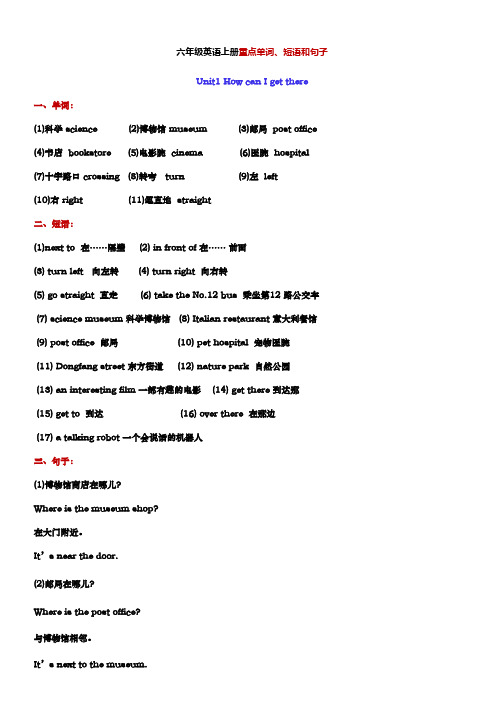
六年级英语上册重点单词、短语和句子Unit1 How can I get there一、单词:(1)科学 science(2)博物馆 museum(3)邮局post office (4)书店 bookstore(5)电影院 cinema(6)医院 hospital (7)十字路口 crossing(8)转弯 turn(9)左left(10)右 right(11)笔直地 straight二、短语:(1)next to 在……隔壁(2) in front of 在……前面(3) turn left 向左转(4) turn right 向右转(5) go straight 直走(6) take the No.12 bus 乘坐第12 路公交车(7) science museum 科学博物馆(8) Italian restaurant 意大利餐馆(9) post office 邮局(10) pet hospital 宠物医院(11) Dongfang street 东方街道(12) nature park 自然公园(13) an interesting film 一部有趣的电影(14) get there 到达那(15) get to 到达(16) over there 在那边(17) a talking robot 一个会说话的机器人三、句子:(1)博物馆商店在哪儿?Where is the museum shop?在大门附近。
It’s near the door.(2)邮局在哪儿?Where is the post office?与博物馆相邻。
It’s next to the museum.(3)我们怎么到那儿?How can we get there?到书店左转,然后到医院右转Turn left at the bookstore. Then turn right at the hospital.Unit2 Ways to go to school一、单词:(1)步行 on foot(2)乘 by(3)公共汽车 bus(4)飞机 plane(5)出租车 taxi(6)大船 ship(7)地铁 subway(8)火车 train(9) slow(使)放慢速度;慢的(10) 减少; 降低 down(11)慢下来 slow down(12)停下 stop二、短语:(1)on foot 步行(2) by bus 乘坐公交车(3) by plane 乘飞机(4)by taxi 坐出租车(5) by ship 乘坐轮船(6) by boat 坐小船(7) buy train 坐火车(8) by subway 坐地铁(9) by bike 骑行(10) by car 坐小汽车(11) by ferry 乘坐渡船(12) by sled 坐雪橇(13) go to school 去上学(说话时不在学校)(14) come to school 来上学(说话时在学校)(15) pay attention to 注意……(16) traffic lights 交通信号灯(17) good exercise 有益的锻炼/运动(18) get there 到那儿(19) so many 如此多(20) cross the road 过马路(21)a life jacket 救生衣(22) drive slowly 开慢点(23) be different from 与……不同(24) take a bus 乘坐公交车(25) ride a bike 骑自行车(26) on the left side 在左边(27) on the right side 在右边(28) the same as 与……一样(28) go to work 去工作/去上班(29) at the cinema 在电影院(30) play with sb 和某人玩(31) go home 回家(32) at school 在学校(33) at home 在家三、句子:(1)你怎么来学校的?How do you come to school.通常我步行来,有时我乘公共汽车来。
六年级英语上册Unit1-5单元单词短语

Unit 1 Public signs单词:堂(表)兄弟问题公共的标志意思是危险必须(离)开草不接近笼子安静噪声某事快地总是吸烟丢,扔骑自行车停放突然地钞票,纸币比赛在周围,四面附近的看守人指出罚款废物垃圾箱词组:1.禁止停车2.禁止吸烟3.禁止吃喝4.禁止践踏草坪5.禁止乱丢杂物6.禁止触摸7.安静8.朝他走去9.罚款5元10.在鸟笼上11.指向24.进去12.只有四岁13.有许多问题14.问问题15.公共标志16.禁止骑车17.在危险中18.制造噪音19.散步20.走向纸币21.一公园看守员22.环顾23.在草地上走25.建筑上的标志26.远离27.禁止拍照28.穿绿色衣服29.穿红色连衣裙的女孩30.作为早餐31.握手32.再试一次33.一张十元钞票句型:1.这个标牌是什么意思?它意指“危险”。
2.那个标牌什么意思?它意指你不应该在草地上走。
3.它是什么意思?它意指你应该远离建筑物。
.4.我现在可以看电视了吗?不,你不可以。
你应该先做你的家庭作业。
5.杰克只有四岁,但他总是有许多问题要问。
6.他正在问本一些有关公共标志的问题。
7.我可以进去吗?不,你不可以。
你必须远离这座建筑物。
部分语言点解析1.动词如果在N o后表示禁止做某事,动词要用in g形式,如:No swimmi ng;如果前面是d on’t 或者do not后面跟动词原形,如:Do not touch.2.must, would, should (should n’t),can,may的区别must 表示必须一定做到的事情;would表示想要做的事情,wouldlike to do sth.should(should n’t)表示应该或不应该;can表示能够,会做某事;may表示可以或允许做某事。
must, should should n't, can, may都是情态动词,后面都跟动词原形。
六年级英语短语归纳总结北师大版上册

六年级英语短语归纳总结北师大版上册Unit 1 Nice to meet you!1. How do you do? - 你好(见面用语)2. Nice to meet you! - 很高兴见到你!3. How are you? - 你好吗?4. I am fine / not bad / great - 我很好 / 不错 / 非常棒5. What’s your name? - 你叫什么名字?6. My name is… - 我叫…7. Excuse me - 对不起,打扰一下8. Thank you - 谢谢你Unit 2 My school day1. get up - 起床2. have breakfast - 吃早饭3. go to school - 去学校4. have classes - 上课5. have lunch - 吃午饭6. play games - 玩游戏7. do homework - 做作业8. go to bed - 上床睡觉1Unit 3 Our family1. parents - 父母2. father - 父亲3. mother - 母亲4. brother - 兄弟5. sister - 姐妹6. grandparents - 祖父母7. grandfather - 爷爷8. grandmother - 奶奶Unit 4 Things to eat1. apple - 苹果2. banana - 香蕉3. orange - 橙子4. strawberry - 草莓5. watermelon - 西瓜6. bread - 面包7. rice - 米饭8. noodles - 面条Unit 5 My body1. head - 头22. eyes - 眼睛3. nose - 鼻子4. mouth - 嘴巴5. ears - 耳朵6. hands - 手7. feet - 脚8. legs - 腿Unit 6 Daily routine1. wake up - 醒来2. brush teeth - 刷牙3. take a shower - 洗澡4. get dressed - 穿衣服5. go to school - 去学校6. have lunch - 吃午饭7. play sports - 运动8. go to bed - 上床睡觉以上是六年级英语短语归纳总结,这些常用的短语可以帮助你更好地理解和运用英语。
最新人教精通版小学英语六年级上册单元知识点总结(全册)

Unit1Igotoschoolat8:00.一、核心词汇1.描述日常活动的词汇cleanthewindow擦窗户cleanthedoor擦门cleanthefloor擦地板2.描述三餐的词汇breakfast早餐lunch午餐dinner晚餐3.描述时间的词汇morning早晨afternoon下午evening晚上; 傍晚4.频率副词often时常; 常常5.其他walk走; 步行every每一个easy容易difficult困难二、拓展词组描述日常活动的词组getup起床havebreakfast吃早餐gotoschool去上学havelunch吃午饭gohome回家havedinner吃晚饭watchTV看电视gotobed睡觉cookbreakfast做早餐teachEnglish教英语takeawalk散步readstories读故事seeafilm看电影playthepiano弹钢琴三、核心句型1.Igetupat7:30inthemorning. 我早晨七点半起床。
解读:此句是一个陈述句, 用来描述我在某一时刻所做的事情。
举一反三:Igotoschoolat8:00inthemorning. 我早晨八点去上学。
2.Shedoesn’tgetupat6:30inthemorning.她不在上午六点半起床。
解读: 此句是一个否定句, 用来描述某人在某一时刻没有做的事情。
举一反三:Shedoesn’tgetupat6:40.她不在六点四十分起床。
3.— WhatdoyoudoonSaturdays? 你星期六做什么?— Ioftengoandseeafilmwithmyparents. 我经常和我的父母一起去看电影。
解读:这是用来询问对方某天做什么及其回答的句子。
举一反三:— Whatdoyoudoontheweekend? 你周末做什么?— Ioftendohomework. 我经常做作业。
六年级上册英语书第四单元重点句型

六年级上册英语书第四单元重点句型一、单词短语(基础)1. hobby (复数hobbies)- 含义:爱好。
例如:My hobby is reading books.(我的爱好是读书。
)2. dancing.- 含义:跳舞。
是dance的动名词形式。
例如:She likes dancing.(她喜欢跳舞。
)3. singing.- 含义:唱歌。
是sing的动名词形式。
例如:His hobby is singing.(他的爱好是唱歌。
)4. reading stories.- 含义:读故事。
例如:I like reading stories very much.(我非常喜欢读故事。
)5. playing football.- 含义:踢足球。
例如:They like playing football after school.(他们放学后喜欢踢足球。
)6. listening to music.- 含义:听音乐。
例如:She often listens to music in the evening.(她经常在晚上听音乐。
)二、重点句型。
1. 询问某人的爱好。
- What are your hobbies?(你的爱好是什么?)- 回答:I like + 动名词(短语). 例如:I like reading books.(我喜欢读书。
)- 也可以用My hobbies are + 动名词(短语). 例如:My hobbies are singing and dancing.(我的爱好是唱歌和跳舞。
)2. 表达某人喜欢做某事。
- like/likes+动名词(短语)- 例如:He likes playing football.(他喜欢踢足球。
)- She likes listening to music.(她喜欢听音乐。
)3. 询问他人是否喜欢做某事。
- Do you like + 动名词(短语)?- 例如:Do you like reading stories?(你喜欢读故事吗?)- 回答:Yes, I do. / No, I don't.- 对于第三人称单数(he/she/it等)则用Does he/she/it like+动名词(短语)?- 例如:Does she like dancing?(她喜欢跳舞吗?)- 回答:Yes, she does. / No, she doesn't.。
六年级上册1~6单元英语短语
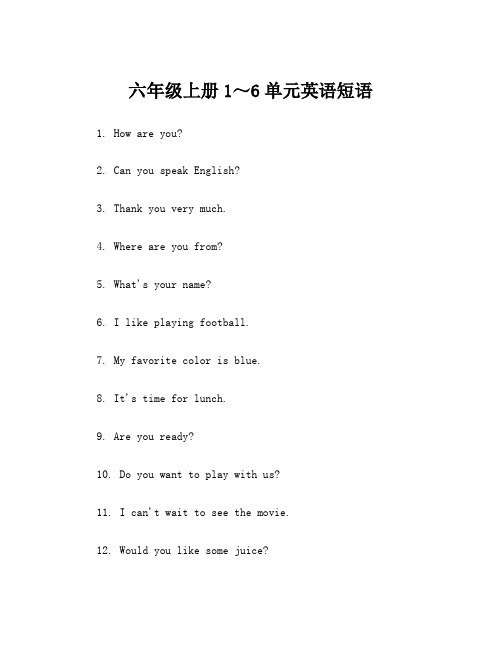
六年级上册1~6单元英语短语1. How are you?2. Can you speak English?3. Thank you very much.4. Where are you from?5. What's your name?6. I like playing football.7. My favorite color is blue.8. It's time for lunch.9. Are you ready?10. Do you want to play with us?11. I can't wait to see the movie.12. Would you like some juice?13. I'll see you later.14. Let's go for a walk.15. I'm going to the park.16. He is a good friend of mine.17. She is an excellent student.18. We are going to have a party.19. They are brothers and sisters.20. The cat is sleeping on the bed.21. The dog is barking loudly.22. I have a big family.23. Do you have any pets?24. I can ride a bike.25. I want to learn how to swim.26. This is my new dress.27. Can you help me with my homework?28. I need to buy some groceries.29. We are going on a field trip.30. The weather is very nice today.31. We should wear sunscreen.32. Don't forget to bring your umbrella.33. The teacher is writing on the blackboard.34. I need to sharpen my pencil.35. The cat is chasing the mouse.36. The birds are singing in the trees.37. I want to play the piano.38. The music is too loud.39. Can you turn it down, please?40. I'm going to the library to borrow a book.41. This is a very interesting story.42. Let's have a picnic in the park.43. I love to listen to music.44. Do you like to read?45. He is very good at drawing.46. I want to buy a new computer.47. Can you show me how it works?48. I'm going to call my friend on the phone.49. Our school is having a sports day.50. I want to join the basketball team.51. Have a great day!。
- 1、下载文档前请自行甄别文档内容的完整性,平台不提供额外的编辑、内容补充、找答案等附加服务。
- 2、"仅部分预览"的文档,不可在线预览部分如存在完整性等问题,可反馈申请退款(可完整预览的文档不适用该条件!)。
- 3、如文档侵犯您的权益,请联系客服反馈,我们会尽快为您处理(人工客服工作时间:9:00-18:30)。
六上Unit 11.long long ago很久以前2. new clothes新衣服3. make new clothes for you为你制作新衣服make sth for sb4. show the king his new clothes给皇帝展示新衣服show sb. sth.= show sth. to sb.5. try on试穿try on the coat=try the coat on try it/them on6.magic clothes有魔力的衣服7. walk through步行穿过8. in his new clothes 穿着他的新衣服9. shout at sb.对某人大叫10. laugh at sb.嘲笑某人11. look at 看….12. point at指向…13. fit well 非常适合14. an American cowboy 一个美国牛仔15. a Scottish man 一位苏格兰人16. tell a story 讲一个故事17. say a/one sentence说一句话18. on the mountain在山上19. the next sentence下一句话20. live in the house住在房子里21. tell the boy a story给这个男孩讲一个故事tell sb. sth.22. it is one’s turn 某人的机会23. think hard努力思考24. have to 不得不have to do sth.25. in front of 在….前面(外部)in the front of 在… 前面(内部)26. walk by 路过27. be nice to sb.对某人好28. look after 照顾29. turn into变成六上Unit 2What a day! 糟糕的一天;忙碌的一天;累人的一天等等(表达的含义很多,根据具体语境来看)这里指“糟糕的一天”1. the 19th of September 在九月十九号2. a sunny/ windy / rainy day 晴朗的/ 刮风/下雨的一天3. a lot of rain 许多雨(不可数)4. a lot of snow 许多雪(不可数)5. see/ watch a parrot show 观看一场鹦鹉表演6. see some interesting parrots看见一些有趣的鹦鹉7. an interesting film 一部精彩的电影8. become windy and cloudy变成大风和阴天(多云)9. fly kites high in the sky风筝放得高10. bring some dumplings带来一些饺子11. bring lunch 带午餐12. some bread and honey 一些面包和蜂蜜13. some drinks 一些饮料14. hungry and thirsty 又饿又渴15. wet clothes 潮湿的衣服16. have/ eat our lunch吃我们的午饭17. black clouds乌云18. meet me/ him/ her/ them/ you 遇见我/他/ 她/ 他们/ 你19. look sad/ happy 看起来很伤心/ 开心20. this morning/ afternoon/ evening 今天早晨/ 下午/ 晚上21. climb up the hill 爬上山22. get up at seven 七点起床23. go to school by bike 骑自行车去上学24. have a picnic野餐25. watch a film看电影26. in the sky在空中27. all day 一整天28. go away 走了29. lose my kite丢了我的风筝30. want to know why想要知道为什么31. what happened出了什么事32. fly too high飞得太高33. find it 找到它34. near the hill 在小山附近35. in your diary 在你的日记里36. hold onto it抓紧它37. fly away飞走了38. find it near the hill在山的附近找到它39. in your diary在你的日记里40. cheer together一起欢呼六上Unit 3e back to school 返校2. the National Day holiday 国庆节假期3.call you 打电话给你4. visit my aunt拜访我的婶婶5. Shanghai Museum上海博物馆6. see many interesting things看见很多有趣的东西7. go to a farm 去农场8. near Star Lake 在星湖附近9. pick some oranges摘一些橙子10. go fishing去钓鱼11. catch a big fish抓到一条大鱼12. Tian’anmen Square天安门广场13. Palace Museum故宫博物院14. Summer Palace 颐和园15. the Great Wall长城16. pick an orange for me为我摘一个橙子17. main school holidays学校主要的假期18. the Easter holiday复活节假期19. the summer holiday暑假20. the Christmas holiday圣诞节假期21. come home late晚回家22. have a fashion show有一场时装秀23. love beautiful clothes爱漂亮的衣服24. be excited about the show 对秀感到激动25 wear paper clothes 穿纸衣服26. wear a lot of bottles穿很多瓶子27. ask about the show询问关于秀的事28. go well进展顺利29. at first在开始的时候30. heavy rain大雨31. the Car Museum轿车博物馆32. visit his cousin拜访他的表兄33. have a birthday party举行一个生日聚会34. catch a fish for me为我抓一条鱼六上Unit 41.then and now过去和现在2.six years ago六年前3. do many things做很多事4. write letters to his friends = write to his friends写信给他的朋友5. in the office在办公室里6. use the telephone使用电话7. call people打电话给人们8. a mobile phone一部手机9. call people anywhere随处打电话给人们10. write/send an email写/发一封电子邮件11. listen to the radio听收音机12. watch news on the Internet在网上看新闻13. read e-books看电子书14. make friends with sb. 与某人交朋友15. e-friends from all over the world来自世界各地的网友16. do shopping = do the shopping = do some shopping = go shopping购物17. work hard努力工作18. invent the aeroplane发明飞机19. an American man一位美国男士20. a British girl一个英国女孩21. have an English lesson上一节英语课22. look out of the window朝窗外看23. listen to me听我说24. go on继续25. spell the new words拼写新单词26. get angry = be angry生气的27. make a sentence with …用…来造句28. wait for the answer等待答案29. a photo of yourself一张你自己的照片30. just now刚才31. a moment ago一会儿以前32. read newspapers for news看报纸上的新闻33. buy things from shops从商店买东西34. use …to… 用…做…35.read and draw 读和画36.do shopping on the Internet 在网上购物37.surf the Internet 网上冲浪38.buy me a mobile phone/buy a mobile for me 给我买手机e the phone to call you 用电话打给你38.like making friends 喜欢交朋友。
1.at a shopping centre 在购物中心2.be careful 当心3.Wet floor. 小心地滑4.a juice shop 一家果汁店5.want some juice 想要一些饮料6.litter everywhere 到处乱丢垃圾7.take it into... 把它带进……8.go in 进入9.eat noodles in a restaurant 在餐厅吃面条10.smell the flower 闻闻花香11.my mother’s birthday 我妈妈的生日12.on an outing 户外远足13.time for lunch 该吃午饭了14.time to have lunch 该吃午饭了15.feel tired and hungry 感觉又累又饿16.look for him 寻找他17.bring some bananas 带一些香蕉18.sweet grapes 甜葡萄19.walk on 继续行走20.look around 四下张望21.design signs 设计标识22.public places 公共场所23.ask and answer 问答24.put it on the wall 把它放在墙上25.No swimming. 禁止游泳26.No climbing. 禁止攀爬27.No smoking. 禁止吸烟28.No eating or drinking. 禁止饮食1. these picture of our city我们的城市的这些图2. Smoke from cars 汽车排出的烟3.make the air dirty 使空气变脏4. black smoke from factories 来自工厂的黑烟5. messy and dirty 又乱又脏6. in the water 在水里7.the fish are dead 鱼死了8. keep our city clean 保持我们的城市干净9. take the bus and the metro 乘公交车和地铁10. walk to school 步行去上学11.move some factories away from our city 把一些工厂移出我们的城市12.put rubbish in the bin 把垃圾放到垃圾箱里13. plant trees 植树14. after school 放学后15.clean and beautiful 又干净又漂亮16. throw a banana skin 扔香蕉皮17.on the ground 在地面上18. pick it up 把它捡起19.make the street messy 使街道变乱20.too late 太迟21.slip on the banana skin 在香蕉皮上滑倒22.go to hospital 去医院1、save water节约用水2、drink water喝水3、use water to clean things用水清洗东西4、every day每天5、in many places在许多地方6、much water许多水7、waste water浪费水8、save energy节能9、come from=be from来自...10、on Earth在地球上11、a lot of energy许多能源12、save trees拯救树木13、make tables做桌子14、cut down砍伐15、too many+可数名词16、too much+不可数名词17、be bad for 对...有害(反)be good for对...有益18、plastic bags塑料袋19、glass bottles玻璃瓶20、Earth Day地球日21、do a project做课题22、all students所有的学生23、make a poster做一张海报24、tell sb about sth告诉某人某事25、tell sb to do sth告诉某人做某事26、on the trees在树上(长在上面的)27、in the tree在树上(不是长在上面的)28、a rubbish bin一个垃圾桶29、at the school gate在学校门口30、protect the Earth保护地球31、drive(过去式)drove32、our home我们的家园1.Chinese New Year春节2.Hong Kong香港3.next week下一周4.in the evening在晚上5.make some cakes做些蛋糕6.Chinese New Year's Eve除夕7.have dinner吃晚饭8.Chinese New Year's Day大年初一9.my parents我的父母亲10.red packets红包11.a lion dance 一场舞狮表演12.watch fireworks看烟花13.the most important holiday最重要的节14.Spring Festival春节15.cook dumplings煮饺子16.get sth from sb从某人那得到(收到)某物17.after dinner晚饭后18.talk about谈论19.a nice cake一个漂亮的蛋糕20.the second day of Chinese New Year 大年初二。
